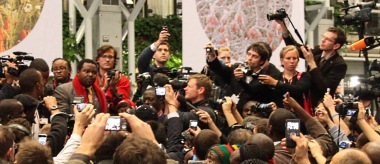 |
| An African delegate protests the Danish Text |
A Danish text has provoked strong protests from developing countries in Copenhagen, while there are calls for nuclear's role to be recognised.
The Danish text, termed the 'Copenhagen Agreement', was leaked to the Guardian newspaper yesteday, although its contents had been discussed informally at preparatory meetings.
At previous COP meetings draft texts have been prepared by the host country in an attempt to cut through the protracted negotiations and provide the basis for a final agreement. However, this text has been perceived as being written from an OECD country's perspective, with little attention given to poorer developing countries.
The text supports the scientific view that global average temperatures should rise by no more than 2 ºC and proposes that global greenhouse gas emissions should peak in 2020, with developed-country emissions peaking before those of developing countries. By 2050 global emissions should have fallen by at least 50%, with developed-country emissions falling by 80%.
There are no technology exclusions in the Danish text, in contrast to previous agreements which have seen nuclear excluded from a group of favoured power sources. Instead there is support for deployment of 'climate friendly technologies'.
While a technology-neutral agreement now seems more likely, a call came today for explicit recognition of the role nuclear energy can play in mitigating climate change. In a comment piece in the OECD Observer Luis Echavarri, head of the OECD Nuclear Energy Agency, complained about nuclear power's exclusion from two Kyoto Protocol flexibility mechanisms - the Joint Implementation and the Clean Development Mechanism - despite 'negligible' emissions compared to fossil fuels and its potential for direct foreign investment and technology transfer from rich to poor nations. He wrote that "it is now time to recognise the value of nuclear energy for reducing greenhouse gas emissions in the legal and institutional framework to be developed in Copenhagen and beyond."
Among the figures Echavarri produced were that nuclear power to date has avoided 60 billion tonnes of carbon dioxide emissions compared to equivalent coal-fired power, and a future expansion to 1400 GWe (from 370 GWe now) would avoid 11 billion tonnes in emissions annually. "These quantities are not at all negligible" and "would contribute massively" to reaching emissions reductions goals, said Echavarri.
Negotiations so far
Despite the emergence of the Danish text, the formal negotiations continue. Developing countries are placing much emphasis on continuing with the current Kyoto Protocol after 2012, rather than introducing a new agreement. Under Kyoto, only developed countries that went on to ratify are required to curb emissions.
This support for Kyoto lead to an extraordinary intervention from the Chinese delegation, which complained that the conference logo only mentioned the COP 15 meeting and not the CMP 5 meeting, which is a separate part of the negotiations under the Kyoto Protocol. This intervention was discussed for some 40 minutes in the main negotiations, despite the fact that the logo has been used for over a year. With negotiations delayed by such matters it seems unlikely that a full agreement will be reached in Copenhagen, with negotiations continuing at next year's COP16 meeting, confirmed for Mexico City.
Meanwhile, other groups are preparing their own proposed texts, the Basic Group (Brazil, South Africa, India and China) has drawn up proposals that would see emission reductions coming primarily from developed countries.







_97013.jpg)






